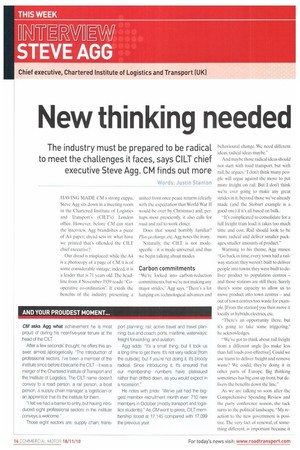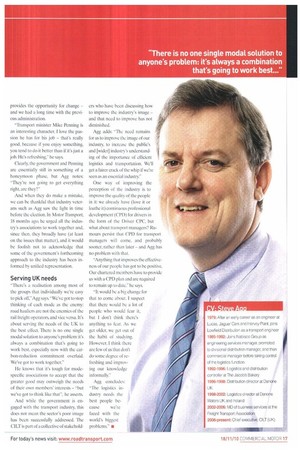New thinking needed
Page 16

Page 17

If you've noticed an error in this article please click here to report it so we can fix it.
The industry must be prepared to be radical to meet the challenges it faces, says CILT chief executive Steve Agg. CM finds out more
Words: Justin Stanton HAVING MADE CM a strong cuppa, Steve Agg sits down in a meeting room in the Chartered Institute of Logistics and Transport's (CILT's) London office. However, before CM can start the interview. Agg brandishes a piece of A4 paper: dread sets in: what have we printed that's offended the CILT chief executive?
Our dread is misplaced: while the A4 is a photocopy of a page of CM. it is of some considerable vintage; indeed, it is a leader that is 71 years old. The headline from 4 November 1939 reads: "Cooperative co-ordination". It extols the benefits of the industry presenting a
united front once peace returns (clearly with the expectation that World War II would he over by Christmas) and, perhaps most presciently, it also calls for road and rail to work closer.
Does that sound horribly familiar? Phis ca change, etc. Agg notes the irony.
Naturally, the CILT is not modespecific — it is mode-universal, and thus we begin talking about modes.
Carbon commitments
"We're locked into carbon-reduction commitments, but we're not making any major strides." Agg says. "There's a lot hanging on technological advances and behavioural change. We need different ideas, radical ideas maybe."
And maybe those radical ideas should not start with road transport. but with rail, he argues. don't think many people will argue against the move to put more freight on rail. But I don't think we're ever going to make any great strides in it. beyond those we've already made (and the Stobart example is a good one) if it's all based on bulk.
"It's complicated to consolidate for a full freight train load: it takes too much time and cost. Rail should look to be more radical and deliver smaller packages, smaller amounts of product."
Warming to his theme, Agg muses: "Go back in time, every town had a railway station; they weren't built to deliver people into towns, they were built to deliver product to population centres — and those stations are still there. Surely there's some capacity to allow us to move product into town centres — and out of town centres too: waste for example. [From the station] you then move it locally in hybrids, electrics, etc.
"There's an opportunity there, but it's going to take some triggering," he acknowledges.
"We've got to think about rail freight from a different angle [to make less than full loads cost-effective]. Could we use trams to deliver freight and remove waste? We could; they're doing it in other parts of Europe. Big thinking sometimes has big cost up front, but delivers the benefits down the line."
As we are talking so soon after the Comprehensive Spending Review and the party conference season, the tack turns to the political landscape. -My reaction to the new government is positive. The very fact of renewal, of something different, is important because it
provides the opportunity for change — and we had a long time with the previous administration.
"Transport minister Mike Penning is an interesting character. 1 love the passion he has for his job — that's really good, because if you enjoy something, you tend to do it better than if it's just a job. He's refreshing,he says.
Clearly, the government and Penning are essentially still in something of a honeymoon phase, but Agg notes: "They're not going to get everything right, are they?"
And when they do make a mistake, we can be thankful that industry veterans such as Agg saw the light in time before the election. In Motor Transport, 18 months ago, he urged all the industry's associations to work together and, since then, they broadly have (at least on the issues that matter), and it would be foolish not to acknowledge that some of the government's forthcoming approach to the industry has been informed by unified representation.
Serving UK needs
"There's a realisation among most of the groups that individually we're easy to pick off," Agg says. "We've got to stop thinking of each mode as the enemy: road hauliers are not the enemies of the rail freight operators, and vice versa. It's about serving the needs of the UK to the best effect. There is no one single modal solution to anyone's problem: it's always a combination that's going to work best, especially now with the carbon-reduction commitment overlaid, We've got to work together."
He knows that it's tough for modespecific associations to accept that the greater good may outweigh the needs of their own members interests — "but we've got to think like that", he asserts.
And while the government is engaged with the transport industry, this does not mean the sector's poor image has been successfully addressed. The CILT is part of a collective of stakehold
ers who have been discussing how to improve the industry's image — and that need to improve has not diminished.
Agg adds: "The need remains for us to improve the image of our industry, to increase the public's and [wider] industry's understanding of the importance of efficient logistics and transportation. We'll get a fairer crack of the whip if we're seen as an essential industry."
One way of improving the perception of the industry is to improve the quality of the people in it: we already have (love it or loathe it) continuous professional development (CPD) for drivers in the form of the Driver CPC, but what about transport managers? Rumours persist that CPD for transport managers will come, and probably sooner, rather than later — and Agg has no problem with that.
"Anything that improves the effectiveness of our people has got to be positive. Our chartered members have to provide us with a CPD plan and are required to remain up to date." he says.
"It would he a big change for that to come about. I suspect that there would be a lot of people who would fear it,
but I don't think there's anything to fear. As we get older, we get out of the habit of studying. However. I think there are few of its that don't do some degree of refreshing and irnproving our knowledge informally."
Agg concludes: "The logistics industry needs the best people be
cause we're faced with the world's biggest problems." •




































































































































